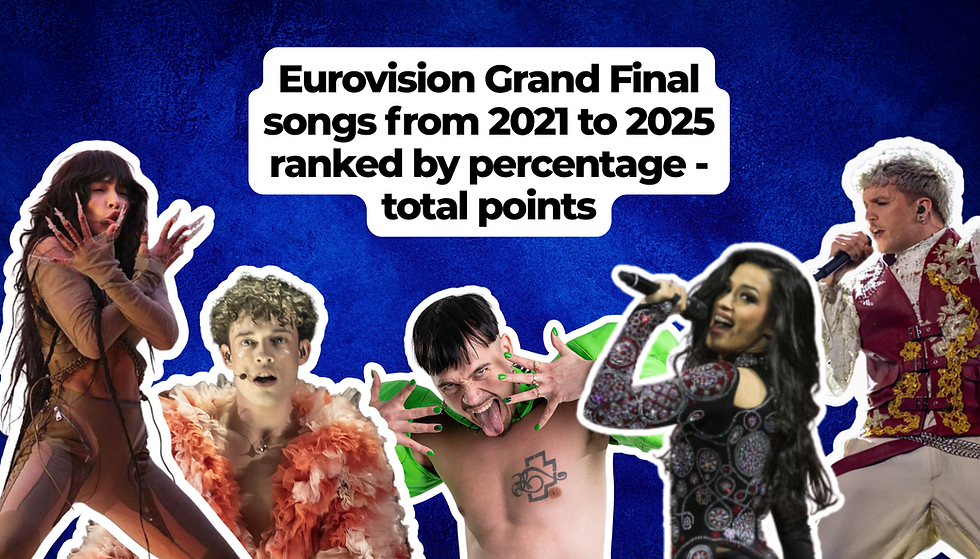Eurovision 2022: Songs by languages
- Kyriakos Tsinivits

- Mar 31, 2022
- 6 min read

At Eurovision in Rotterdam last year, four out of the top five songs were in languages other than English. The last time that happened at Eurovision was in 1996.
This has made an impact this year. We have seen an uptick in countries entering songs in languages other than English. In our recent article crunching the numbers on the Eurovision 2022 songs, we found that total number of songs in languages other than English jumped to 14 this year, up from just 10 last year.
In this article we look deeper into the languages that will be sung at Eurovision 2022 with many making a return - and a very old language making its debut!
'Sekret': the Albanian and English bop
Representing Albania at Eurovision 2022, Ronela Hajati will be singing 'Sekret' in both Albanian and English. It is only the third ever entry from Albania to be in both languages.
The other two entries in Albanian and English were 'Hear My Plea' by Frederik Ndoci in 2007 and 'Feel the Passion' by Aurela Gaçe in 2011. Both of these entries failed to qualify for the Eurovision Final.
Albania has qualified to the Grand Final in the last three Contests and all those entries were solely sung in Albanian. As no Albanian entry in both Albanian and English languages has ever qualified, we will have to wait and see if Ronela's bop can turn things around.
Au revoir to the French language...
Last year two French songs finished in the Eurovision top 5: Barbara Pravi's 'Voilà' and Gjon's Tears 'Tout l'univers'. Despite last year's success with the French language, there will not be a French song sung at Eurovision this year! The last time this happened was in 2011.
Even France isn't sending a French language entry! Representing France this year is Alvan and Ahez with 'Fulenn', which will be sung in Breton, a southwestern Brittonic language. Interestingly it's not the first time Breton has featured at Eurovision. France competed with a song in Breton at Eurovision 1996 with 'Diwanit bugale' by Dan Ar Braz and l' Héritage des Celtes.
Dutch language makes a return
S10 is bringing back Dutch to Eurovision with her epic entry, 'De diepte'. The last time the Netherlands sung in Dutch on the big stage was in 2010 with Sieneke's 'Ik ben verliefd (Sha-la-lie)'. Unfortunately it didn't qualify for the Grand Final.
If S10 makes the Eurovision Grand Final it will be first time since 1998 that the Netherlands will compete at a Grand Final with a Dutch language entry. In 1998, Edsilia smashed it with her energetic 'Hemel en aarde' which finished in fourth place.
Cyprus returns with the Greek language
The Greek language makes its return to Eurovision after a four-year absence. Greece's entry for Eurovision 2018, 'Oniro mou' by Yianna Terzis, was the last time we heard Greek lyrics at the Contest.
This year Cyprus' Andromache will be singing 'Ela' with both Greek and English lyrics. For Cyprus it will be the first time an entry will be sung in both languages. The last time Cyprus had a song fully in Greek was back in 2013 with Despina Olympiou's 'An me thimasai'.
In the last two decades, the two songs Cyprus sent to Eurovision in the Greek language failed to qualify to the Grand Final. Hopefully Andromache can turn things around!
A return to Icelandic language
The newly named band of sisters, Systur, are representing Iceland with the song, 'Með hækkandi sól', which is sung in Icelandic. The last time we heard Icelandic at Eurovision was very recently: in 2019 with Hatari's 'Hatrið mun sigra'. Hatari managed to get Iceland a qualification to the Eurovision Grand Final after four straight years of non-qualifying entries.
Since the start of the semi-final era in 2004, Iceland have only sent two Icelandic entries, with both entries making it to the Final. So it might just be some good news for Systur.
San Marino and the Italian language
Achille Lauro will be delivering his entry 'Stripper' in Italian and English. 'Stripper' is only the third entry from San Marino to contain Italian lyrics since making their debut in 2008. The last song in Italian by San Marino was Valentina Monetta's 'Crisalide (Vola)' in 2013.
History is not on Achille's side, though. San Marino have only ever qualified for the Eurovision Grand Final three times (twice in the last two Contests) but all the songs were in the English language. If anyone can deliver a memorable performance to qualify it would have to be Achille.
This year we have two entries featuring the Italian language. As well as San Marino's 'Stripper', Italy is being represented by Mahmood and Blanco's Italian duet ballad 'Brividi'. The last time we had a Contest with two Italian entries was in 2018 when Elina Nechayeva sung 'La forza' for Estonia, while Italy was represented by Ermal Meta and Fabrizio Moro with 'Non mi avete fatto niente'.
Latin at Eurovision?
This year Serbia will be delivering a first at Eurovision. Konstrakta will be singing a verse of her 'In corpore sano' in Latin. It will be the first time Latin will be sung on the big stage.
'In corpore sano' is mostly in Serbian. Serbia has a great track record with their native language at Eurovision with 80% of their Serbian entries qualifying for the Grand Final. This may be a good sign for Konstrakta.
Lithuanian waits 28 years to reappear
The last time Lithuania sent a song solely in the Lithuanian language was for their debut entry in 1994 when Ovidijus Vyšniauskas sung 'Lopšinė mylimai'. It unfortunately finished in last place with nul points!
Lithuania did sing a song in both English and Lithuanian in 2001 with Skamp's 'You Got Style', finishing in a respectable 13th place. But since then Lithuania only ever sent entries that featured English lyrics, with the exception in 2009 when the song was both English and Russian.
Eurovision 2022 marks a big year for this Baltic country, sending a song solely in Lithuanian language with Monika Liu's 'Sentimentai'. She cleaned up at national final 'Pabandom iš Naujo! 2022', coming out on top with the jury and the televoters.
If Monika qualifies to the Grand Final it will be the first time in 28 years that we will get to hear Lithuanian language on the big stage on May 14.
Portugal takes another risk with English
Portugal made history last year with their first-ever Eurovision entry in the English language, thanks to The Black Mamba's 'Love Is On My Side'. It managed to qualify for the Final and finish in 12th place.
This year Portugal have again gone with an entry with English lyrics, albeit combined with Portuguese. 'Saudade, saudade' by Maro will be sung in both English and Portuguese. It's a big risk for Portugal. The last time an entry of theirs was in both English and Portuguese was in 2006 and it failed to qualify for the Final. In fact during the Eurovision semi-final era Portugal have failed to qualify every time they've submitted entries sung in both languages. During their five qualifications to the Final since 2004, Portugal have only qualified with songs entirely in Portuguese, or entirely in English.
Out of their 52 Eurovision entries, 'Saudade, saudade' will be the fourth song in English and Portuguese together and hopefully their first time in 19 years to qualify.
All aboard with Romanian
Moldova makes a return with an entry in the Romanian language at Eurovision, which is the official language of Moldova. This year Zdob și Zdub return, joined this time by Frații Advahov to deliver the fast-paced entry, 'Trenulețul'. It is the second time Moldova has sent an entry solely in Romanian, the last time was in 2013 with Aliona Moon and 'O mie', which qualified for the Grand Final.
Since then, Moldova have sent only English language songs to Eurovision and had a rocky qualifying record. Since 2013 only three of their seven English language entries qualified. Here's hoping Zdob și Zdub's Romanian language entry about a train ride from Chișinău to Bucharest sees a return to form.
Other languages this year

Other countries with languages other than English competing this year are Ukraine, who return with their second ever entry solely in the Ukrainian language, Kalush Orchestra's 'Stefania'. This comes off of the success of 'Shum' finishing in the top five last year.
Slovenia will be returning with an entry in Slovene with Disko' by LPS. After qualifying twice with entries in the Slovene language in 2018 and 2019, but missing out last year on getting to the Final with their English entry 'Amen', it makes sense to go back to what works well for them.
Spain are taking a bit of a risk this year with 'SloMo'. Their entry by Chanel is in both the Spanish and English languages; the last time a Spanish entry featured both languages was in 2017 with 'Do It For Your Lover'... and we know what happened there. Hopefully we don't see the same fate with Chanel.
There you have it: a run-through of all the languages other then English that will competing at Eurovision this year. Will one of these songs follow last year's winning entry, the Italian language 'Zitti e buoni' and make it a back-to-back win for languages other than English? We will have to wait and see.



google 优化 seo技术+jingcheng-seo.com+秒收录;
Fortune Tiger Fortune Tiger;
Fortune Tiger Fortune Tiger;
Fortune Tiger Fortune Tiger;
Fortune Tiger Slots Fortune…
站群/ 站群
gamesimes gamesimes;
03topgame 03topgame
EPS Machine EPS Cutting…
EPS Machine EPS and…
EPP Machine EPP Shape…
Fortune Tiger Fortune Tiger;
EPS Machine EPS and…
betwin betwin;
777 777;
slots slots;
Fortune Tiger Fortune Tiger;
google seo…
03topgame 03topgame;
gamesimes gamesimes;
Fortune Tiger…
Fortune Tiger…
Fortune Tiger…
EPS Machine…
EPS Machine…
seo seo;
betwin betwin;
777 777;
slots slots;
Fortune Tiger…
seo优化 SEO优化;
bet bet;
google seo…
Fortune Tiger…
Fortune Tiger…
Fortune Tiger…
Android Android
software software
Q&A Q&A
Notícias Notícias
sitemap sitemap;
sitemap sitemap;
google seo google seo技术飞机TG-cheng716051;
03topgame 03topgame
Jogos JOGOS
Fortune Tiger Fortune Tiger;
Fortune Tiger Slots Fortune Tiger…
Fortune Tiger Fortune Tiger;
EPS машины EPS машины;
Fortune Tiger Fortune Tiger;
EPS Machine EPS Cutting Machine;
EPS Machine EPS and EPP…
EPP Machine EPP Shape Moulding…
EPS Machine EPS and EPP…
EPTU Machine ETPU Moulding Machine
EPS Machine EPS Cutting Machine;
谷歌seo推广 游戏出海seo,引流,快排,蜘蛛池租售;
Fortune Tiger Fortune Tiger;
Fortune Tiger Fortune Tiger;
Fortune Tiger Fortune Tiger;
Fortune Tiger Fortune Tiger;
Fortune Tiger Slots Fortune Tiger Slots;